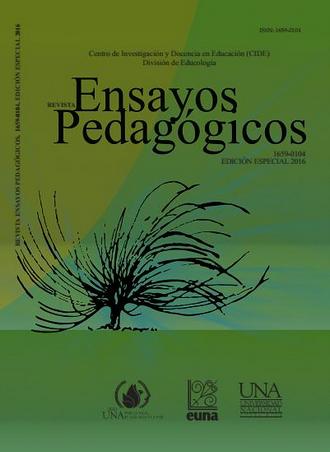Social Networks and University Communication: The Challenges of Universidad Veracruzana in the Time of the Internet
DOI:
https://doi.org/10.15359/rep.esp-16.2Keywords:
social networking, Internet, university communication, empowerment and universitiesAbstract
The use of the Internet and social media has transformed the world of communication. Citizen empowerment through these technologies has been very controversial, and public universities in Mexico are not an exception because this issue is of special political and social importance. Thus, the article “Social Networks and University Communication: The Challenges of the Universidad Veracruzana in the Era of Internet” is intended to reflect on the many facets of this epiphenomenon. On the one hand, the reconversion of their use must be located in the context of the sociological causes that determine these attitudes towards anything that is considered an authority. A second thought is conceptual in nature and is related to the economic and political situation that universities in Mexico live, specifically in the state of Veracruz. A third reflection is stated in epistemological terms because a traditionalist approach to communication still prevails, which is vital to transcend with a modern vision of what is happening on the stage of globalization. The challenge then is to overcome the demonization of this means for the Internet and social networks to be included in a policy of university communication with fair assertiveness to form better citizens, which, in the future agenda, will surely be one of the main challenges for higher education in Mexico, most likely in Latin America and perhaps in the world.
References
Carreño, J. (Febrero, 2000). Cien años de subordinación. Un modelo histórico de la relación entre prensa y poder en México en el siglo XX. Sala de Prensa, 2(16). Recuperado de http://www.saladeprensa.org/art102.htm
Castells, M. (2000). La era de la información. Economía, sociedad y cultura (Vol. 2, El poder de la identidad). Madrid: Alianza.
Córdova, A. (1972). La formación del poder político en México. México: Era.
Esteinou, J. (1983). Los medios de comunicación y la construcción de la hegemonía. México: Nueva Imagen.
Estulin, D. (2011). Desmontando a WikiLeaks. Barcelona: Planeta.
Fukuyama, F. (1989). El fin de la historia y el último hombre. México: Planeta.
Giddens, A. (1999). Un mundo desbocado. Los efectos de la globalización en nuestras vidas. Madrid: Taurus.
Gómez, N. (viernes 8 de 2013). Recursos para educación no son ‘dádivas’: ANUIES. El Universal. México. Recuperado de http://www.eluniversal.com.mx/nacion-mexico/2013/recursos-para-educacion-no-son-39dadivas-39-anuies-964156.html
Huntington, S. P. (1998). El choque de las civilizaciones y la reconfiguración del orden mundial. México: Paidós.
Instituto Nacional Electoral. (2014). Informe del país sobre la calidad de la ciudadanía en México. México: INE-Colegio de México.
Ladrón de Guevara, S. (2013). Programa de Trabajo. Tradición e innovación. México: Universidad Veracruzana. Recuperado de http://www.uv.mx/juntagob/designacion-2013-2017/
Luna, E. (28 de enero, 2015). Pide UNAM-ANUIES aumento urgente de presupuesto en educación superior. El Punto Crítico. México. Recuperado de http://www.elpuntocritico.com/opinion/columnistas/130-columna-asi-le-fue-al-presidente/107489-pide-unam-anuies-aumento-urgente-de-presupuesto-en-educaci%C3%B3n-superior.html
Martínez, R. D. (2014). Comunicación y TIC: De la masa a la red, un cambio en el paradigma. En A. Ramírez-Martinell y M. A. Casillas (Eds.), Háblame de TIC: Tecnología Digital en la Educación Superior (85-106). Argentina: Brujas.
Martínez, R. D. (Marzo– mayo, 2015). Medios y opinión pública. Las veedurías de medios en época de crisis. Razón y Palabra, 89. Recuperado de http://www.razonypalabra.org.mx/N/N89/RE89/01_Martinez_R89.pdf
McLuhan, M. (1964). Understanding Media: The Extensions of Man. Nueva York: McGraw-Hill.
McLuhan, M. (1972). La galaxia Gutemberg. Génesis del homo typographycus. Madrid: Aguilar.
Ubieta, E. (2011). WikiLeaks: Sobre la libertad de información y la descontextualización de la historia. Recuperado de http://la-isla-desconocida.blogspot.com/2011/01/wikileaks-sobre-la-libertad-de.html
Downloads
Published
How to Cite
Issue
Section
License
Ensayos Pedagógicos is subscribed to the Attribution-NonCommertial-NoDerivatives 4.0 International Creative Commons Licence, which allows both authors and readers to freely download, store, copy, and distribute the final approved publisehd version of the manuscript (post-print) as long as this is done without commercial purposes, no derivative works are generated, and the source and author are mentioned. As well, Ensayos Pedagógicos declares that authors will remain the rightful owners of the copyrights of their work in perpetuity.







